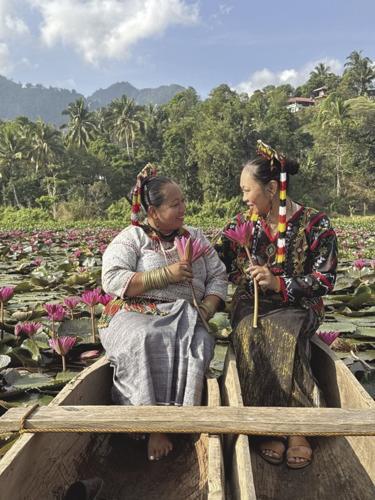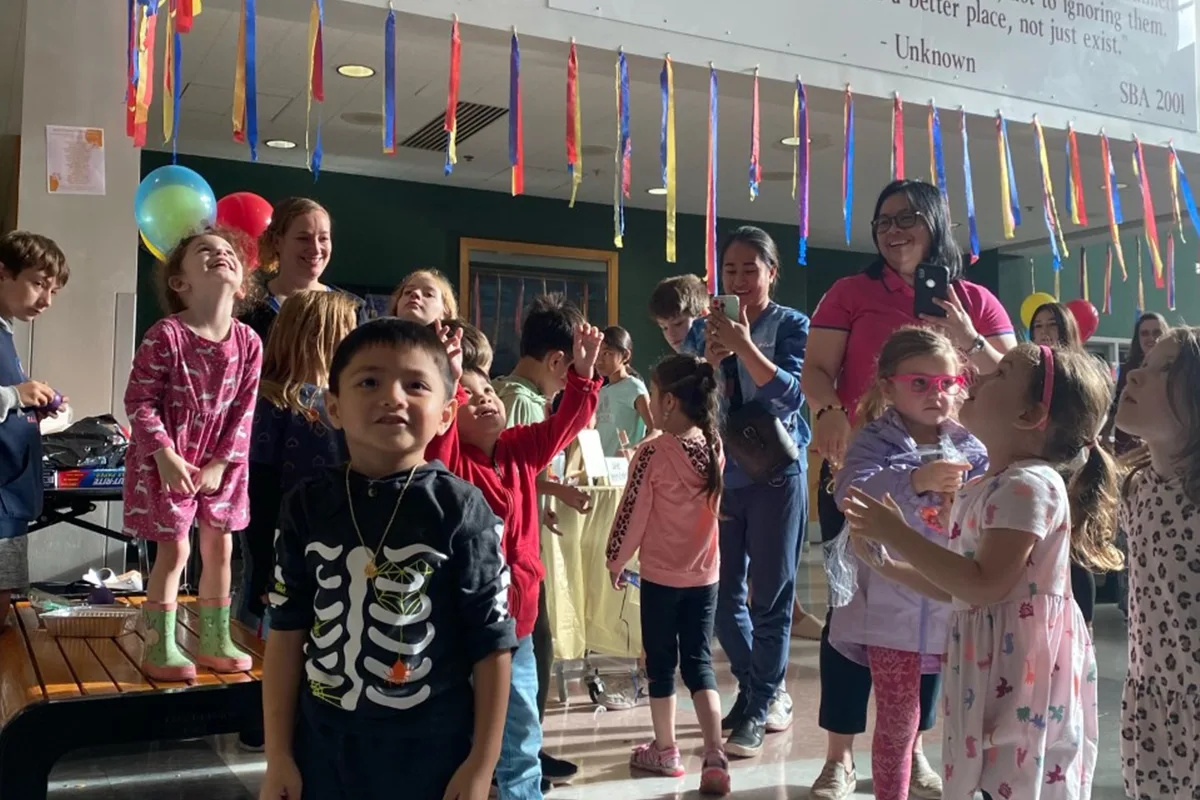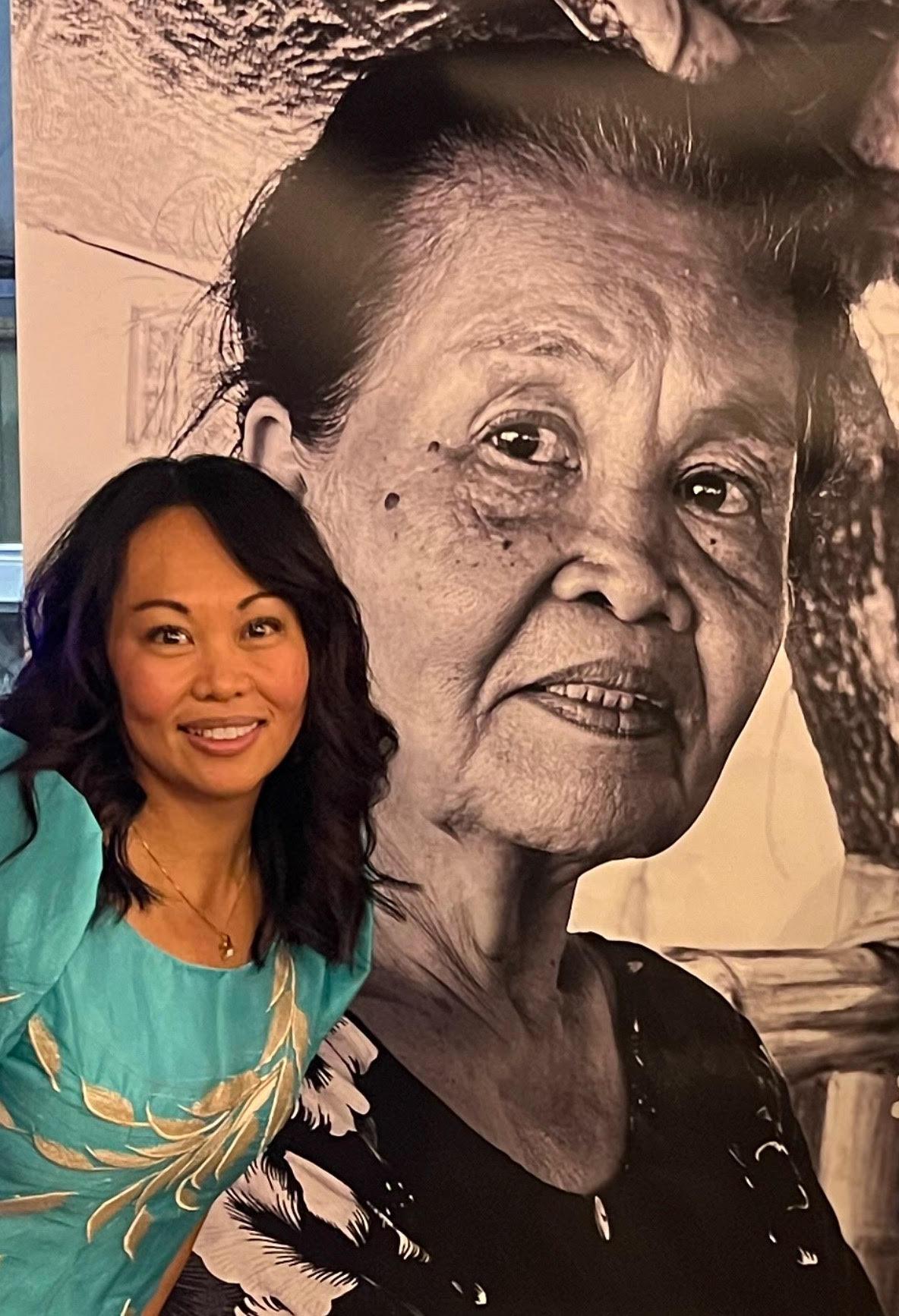
Alma Manabat Parker, right, with T'boli cultural bearer Lyn Buti on Lake Sebu, South Cotabato, Philippines. Alma Manabat Parker
Amanda Dale • October 25, 2024
This month, we are sharing in-depth profiles of the three winners of the 2024 Governor’s Awards in the Humanities. Our final profile is of Alma Manabat Parker who is receiving the Distinguished Service to the Humanities in Community Award. This award recognizes an Alaska individual or organization that has helped strengthen communities by forging connections between people across, race, class, and cultural divides. Director of Development & Communications Amanda Dale spoke with Parker about her life and work in Ketchikan.

Alma Manabat Parker, right, with T'boli cultural bearer Lyn Buti on Lake Sebu, South Cotabato, Philippines. Alma Manabat Parker
How did your family come to live in Ketchikan?
My father was enlisted in the US Coast Guard. I was born in Manila and at 8 months old he was able to petition my mother and I to come to the US. Our first station was Mobile, AL where we spent 3 or 4 years and then we were transferred to Kodiak. We spent a couple years there before my dad was transferred to Ketchikan, our final station. My father made great strides to keep us in Ketchikan so we didn’t have to move around so much; especially when we started school. I have called Ketchikan home for 40+ years.
Talk to me about how you stayed connected to your culture, growing up far away from the Philippines. What was that like?
I was surrounded by Filipino family members and family friends, people who looked like one another, we ate the same food, shared the same customs and celebrations, and we spoke Tagalog and our regional dialects. But as a kid, how do you truly connect when you’re also being forced to assimilate in so many ways because you don’t want to be different? I ended up setting aside my cultural identity, to the point of being ashamed of it at times. I still remember asking my mom and grandma to not speak to me in Tagalog in public. They would speak to me in our language and then I would respond only in English. It was an internal struggle within myself to always want to fit in and belong. And now, I wish I could speak Tagalog more fluently!
My mom also encouraged us to connect to our roots by sending us to weekly Filipino folk dance practice on Sundays. This is where we would learn traditional dances with fellow FIlipino youth. We would practice then perform at our local church, for the 4th of July, and other special events throughout the year. This was the time you could really feel a vibrant and strong FIlipino presence in the community; a stronger sense of belonging and cultural pride!

Kids celebrating at Ketchikan's Fil-Am Festival. Ketchikan Kapamilya
You left Ketchikan briefly as an adult and then returned to raise your family there. How did you feel the sense of cultural pride changed in that time?
In my opinion, it felt like our community slowly lost its sense of connection and purpose on why we did things like Filipino Folk dance. It appeared our community became invisible or too busy with work and life; we lost a sense of cultural connection. We didn’t have cultural weekly dance classes, no enrichment within our schools, no celebrations that truly focused on our heritage. And then to top it all off, we lost our community space in 2015. This was the space we gathered, the place we connected with other Filipinos, to share food and language - so I can see why we lost our sense of belonging, our culture was losing its presence in Ketchikan, and our identity slowly being pushed aside as not as important.
How did you first start working with the Ketchikan Wellness Coalition?
I was recruited for the position of health equity coordinator in 2021 and I thought, “Why am I doing this - I have no idea what health equity means.” I just knew that this project was about helping Filipino people improve their health care and health access. I also knew that the best way to share information about the new program was to have a big party! So I organized our first Filipino-American (Fil-Am) festival in the fall of 2021. We organized it within a month and a half. Even with COVID protocols in place with masks, restrictions on food, COVID pre-screening, etc., 400 people attended! I knew this was something special - our people were ignited. People wanted to be seen - in the front, wanting to be recognized as Filipino! Our people were like, “Oh my god - now people see us!”.
Health equity is culture. Culture is our medicine. We need it to feed us, to teach us, to bring health to our whole beings.
Can you share about how you help others form cultural connections while you are also looking for those connections yourself?
You cannot teach about cultural connections without also learning and growing your own connections. How can I be part of a program where I also have to bring my holistic whole self, accepting my own culture? How can I teach all these people if I’m not able to teach myself? That’s probably the same story that most Filipinos feel because if we do not personally connect with our culture, why would we expect our family - especially our youth to connect. We have worked on developing and reinvigorating our folk dance culture; bringing people in who are stewards of that work and to take pride in our heritage. Those who taught me before, like Gramma Clara Diaz, now 92, have reminded me that this work has come full circle. She says, “You are continuing everything we started back then.”
As far as my journey, I think I’m in the middle chapter of my life…I still have a lot to learn and pass on…
I want to ask about your nominator, Czarina Nicole Cabillo. She called you a mother figure and spoke about how you provided the guidance and support that helped her get through arriving to the US at 15 years old during the pandemic. Tell me about your story of supporting her.
I’ve been coaching the dance teams for 20 years now and every year you have the challenges of being a coach. Academics and grades always come first when you are a student athlete. Czarina’s story was different….she immigrated to the US amidst COVID and they were only doing online courses. Like most immigrant families, the tight living conditions are normal…a two-bedroom apartment with six people. She’s the eldest of her family - like me - and immigrating here without her mother. The eldest, especially if you’re a daughter, often becomes the “substitute” mother to the younger siblings. This is a common storyline for hardworking Filipinos. I knew that I could not let this girl fall through the cracks. She’s still a kid - in charge of her two younger siblings, making sure they get to school, being the maternal figure for the whole household. I knew that her story could go another way if I did not extend the extra effort.
I didn’t know much about her; I had no idea who her family was or how she came to immigrate to Ketchikan. It was still COVID so you barely got to see/talk to students on a consistent basis. But there was something about this storyline that I found comparable to me and just knowing the pressures on the eldest of the family… the pressures that it takes to make it in America - I know I had to be the extra person lending a helping hand.
I didn’t have that extra helping hand for myself and sometimes I held resentment because my parents didn’t go to school in the U.S. They could not help me write an essay or do science projects - I had to learn it all on my own. But my parents supported me in other ways - like getting me the best typewriters or a brand new set of encyclopedias. My parents knew they could not provide the educational guidance other kids would get because they were also trying their best to learn about living in America at the same time as us. Maybe that’s another reason why I set aside my Filipino culture because I thought, “if I were not Filipino, maybe life would be easier. My classmates always seem to have the help with writing reports and projects whereas my parents supported me with the tools and supplies needed to do the stuff but I had to figure it out on my own. We grew up knowing that we needed to succeed for our family’s sake but if you don’t have advantages and a helping hand, some of us will fall through the cracks.
I cannot tell you how thankful I am for this relationship with Czarina. I’ll never be the substitute for being her mom, I consider myself more like a bonus mom. She’s my partner in a lot of stuff I’m doing right now. She is now the only certified interpreter in our community, I remind her that she deserves to get compensated for this work she’s doing. I see her becoming a young adult woman trying to make it on her own. A strong, resilient Filipina who I admire. AND she still picks up her little brother, makes sure he has lunch, brings him to all of his sports clubs, supports her sister with fundraising, in addition to working with the health equity project.

Alma Manabat Parker Alma Manabat Parker
Where else do you see the effects of your work?
When we go to schools for cultural enrichment classes during the months of September and October, we see Filipino kids acknowledge their heritage even more! We see non-Filipinos wanting to learn more about other cultures. Students FEEL seen and the feedback we are hearing from teachers with students who are often shy or quiet, sitting in the back of class, are now raising their hand proudly sharing statements like - “I’m Filipino just like Ms. Alma.” Finding those simple connections within a 30-minute session can make a student feel connected, to feel like somebody can relate to them. Now those kids are more confident, they ask other kids to play on the playground - finding their own connections elsewhere…..It’s a ripple effect.
Join the Forum and the Alaska State Council on the Arts on Tuesday, Oct. 29 at the Anchorage Museum to celebrate the 2024 Governor’s Awards! Get your tickets here.
The Alaska Humanities Forum is a non-profit, non-partisan organization that designs and facilitates experiences to bridge distance and difference – programming that shares and preserves the stories of people and places across our vast state, and explores what it means to be Alaskan.
November 13, 2025 • MoHagani Magnetek & Polly Carr
November 12, 2025 • Becky Strub
November 10, 2025 • Jim LaBelle, Sr. & Amanda Dale